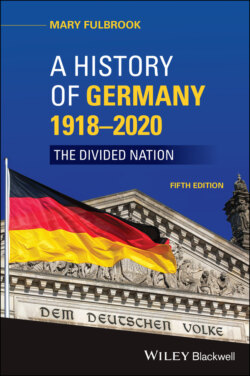Читать книгу A History of Germany 1918 - 2020 - Mary Fulbrook - Страница 8
Acknowledgments
ОглавлениеThe story of Germany in the twentieth century is a compelling one, which has profoundly affected European and world history. It has dramatically shaped – and drastically truncated – the lives of millions of people, Germans and non‐Germans, and continues to be of central importance in European and world affairs.
At a very personal level, my own interest in German history was stimulated by my mother, a refugee from Nazi Germany. Born during the First World War, growing up in the Berlin of the 1920s and early 1930s, her whole life was radically affected by being the child of a ‘mixed marriage’, ensuring that as a ‘non‐Aryan’ she would have no future in Hitler’s ‘national community’. In many ways, this book is for her.
Friends and acquaintances in both Germanies (pre‐1990!) provided many insights. It would be invidious to name selected individuals. I am grateful particularly for the willingness of many East Germans to enter into very open and wide‐ranging discussions. On a number of visits to the GDR, I spoke with people from a wide variety of backgrounds, including members of the SED, dissenters, committed Protestants of a range of political persuasions, and others. Both arranged interviews and more informal talks turned out, in retrospect, to have taken place in a historic moment before a whole sociopolitical system was about to pass away, and have informed my understanding of the dynamics of pre‐revolutionary East Germany. Some of the views and comments made by people to whom I spoke before 1989 could not be captured again except as refracted and distorted with the ‘benefit’ of hindsight.
While actually engaged in writing this book, the East German revolution unfolded. The wonders of word processing made it relatively easy to change the present to the past tense with respect to discussions of Honecker’s Germany; more problematic was the realization that what is of interest to both author and readers changes rather fundamentally when a revolution is known to be on the political agenda. It then becomes apparent which elements of the historical kaleidoscope will prove to be of central importance and which can be consigned to the sidelines, as, perhaps, of only antiquarian interest. As the focus of current discussion changes, so too do the points of historical interest. The contemporary relevance that lies behind the construction of historical accounts becomes all too clear when the parameters that constitute the ‘present’ are rapidly changing.
I would like to thank Fontana for bearing with me while I sat on, and periodically altered, the text (sometimes it seemed I would have to update and revise Chapter 13 in particular at weekly or even daily intervals). Over a somewhat longer period, I am grateful to colleagues and students at University College London for their stimulation and support. Students of my intercollegiate history seminar on the two Germanies will recognize many of our discussions in the chapters that form Part II. Participation in conferences organized by, among others, the German History Society, also helped to inform my views and approach. More particularly, I am extremely grateful to Professor William Carr, Dr Jill Stephenson and the reader for Fontana for their very valuable comments on the manuscript. While I have not been able to act on all their suggestions, they have certainly saved me from a number of errors and helped me to clarify aspects of the account. The responsibility for the inaccuracies and infelicities that remain is, of course, entirely mine.
The maps were produced by the UCL Geography Department, and I would particularly like to thank Louise Saunders for her work. Grants from the British Academy, the University of London Central Research Fund, and the UCL Dean’s Fund have assisted periods of research in Germany. I am very grateful for this support.
Finally, I would like to thank my husband and three children for suffering and sustaining the research for and writing of this book. Without my husband’s unfailing support, and more than equal partnership in parenting, the book could not have been written. Without my children, recounting the fates of those who were born into less fortunate historical circumstances might have been much less meaningful.
